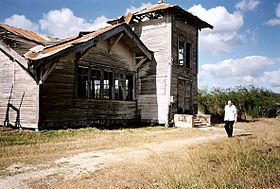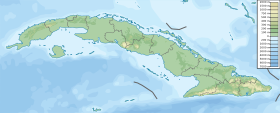Omaja facts for kids
Quick facts for kids
Omaja
|
|
|---|---|
|
Village
|
|

Ruins of the original Methodist church of Omaja
|
|
| Country | |
| Province | Las Tunas |
| Municipality | Majibacoa |
| Founded | 1905 |
| Elevation | 90 m (300 ft) |
| Population
(2011)
|
|
| • Total | 6,150 |
| Time zone | UTC-5 (EST) |
| Area code(s) | +53-31 |
Omaja is a small village and consejo popular (which is like a local council area) in the municipality of Majibacoa, Cuba. It is located in the eastern part of the Las Tunas area. Omaja is about 50 kilometers (31 miles) southwest of Holguín and 20 kilometers (12 miles) east of Las Tunas city.
Contents
The Story of Omaja
How Omaja Began
The land where Omaja now stands was sold by a person named Lico López to an American named D. E. Kerr and his group. This group wanted to settle and develop the land. The town of Omaja was started by American Methodists, a type of Christian church.
In 1905, the Americans who settled there quickly began building a town. They designed it with an architectural style similar to the American west. The streets were even named after the men who bought the land, such as Kreider, Frankbert, and Blasser.
Unlike most other towns in Cuba, Omaja does not have a Roman Catholic church. This is because it has remained a small, Methodist town since it was founded. However, in the past, a small number of Catholics lived there. They would have a monthly church service with a priest who traveled from another town.
Early Communities and Challenges
Between 1906 and 1909, a unique community called Ponnistus existed just outside Omaja. This was a Finnish Utopian community. It was started by Oscar Norring, a merchant sailor, and William Keskinen. Most of the people in this community were Finnish-American loggers, miners, and craftspeople. Norring had worked for a fruit company, and he dreamed of the community growing citrus fruits. However, they faced challenges like a lack of water and poor connections to the railroad, which made their efforts difficult.
The Railroad and Naming the Town
Between 1909 and 1910, a section of the Central Railroad was completed. When the train station opened, the town was first named Majibacoa. But then, a new sign appeared overnight with the name "Omaha." This name was a reference to a Native American tribe. The local Cubans did not like this change. After several discussions and changes, the name Omaja finally stuck.
Omaja's Growth and Changes
A census in 1919 showed that Omaja had 2,381 residents. The town had many businesses, including:
- 13 different types of trades
- Three hotels
- A phone center
- A silent cinema (movie theater)
- Two bakeries
- Two cemeteries (one for Cubans and one for Americans)
- A Ford car agency
- Two sawmills
- A shop for cabinetmakers
In 1920, political problems between different groups and a banking crisis caused Omaja's growth to slow down. The plans for further development by the American settlers came to an end.
Later, in 1928, the construction of the Central Highway began to affect Omaja. Many of its residents moved to other towns like Las Parras, Gastón, and Buenaventura. They moved to be closer to the new highway, which caused Omaja to decline for a while.
See also
 In Spanish: Omaja para niños
In Spanish: Omaja para niños
 | Toni Morrison |
 | Barack Obama |
 | Martin Luther King Jr. |
 | Ralph Bunche |


